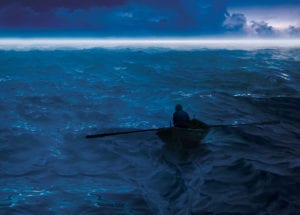By Daniel de la Calle
Here is the classic list of web finds you have seen right here in the past. This week I dug out two great videos, info about a workshop in China, a job offer, some news and a literary reference, clearly enough to enhance your weekend experience.
Echinoderms will be fine. According to recent research, sea urchins, starfish or sea cucumbers will be able to adapt to increasingly acidic oceans. I knew about sea urchin’s resilience and adaptability from seeing how they are one of the few living creatures left at harbors in Spain. We do not eat them, but they are a very popular dish in France and Japan. Sea cucumbers have always had a special place in my heart and imagination. When I was 10 I read a couple of Emilio Salgari’s stories and one was titled Trepang Fishermen (I Pescatori di Trepang) and it was about the sea cucumber fishermen in Indonesia. Sea cucumbers are very popular all along Asia, as food and for their medicinal values. The illustrations in my book showed some steaming hot delicious trepang that locals devoured. I have to admit they do not look as tempting when seen underwater, but I am ready to try them. Anywhere in New York you might know?
Read more HERE
Continuing in Asia, Chinese Xiamen University is offering a joint international workshop on Climate Change and Ocean Carbon on April 3-4, 2011. More specifically, the second day’s theme is “Coastal Carbon & Ocean Acidification”. You can register online HERE (ha ha ha) and read more about it HERE.
Interested in a postdoctoral position in Coral Ocean Acidification? There is one postdoc position to join a recently funded research project investigating the physiological impacts of ocean acidification, temperature and nutrients on reef building corals at the University of Delaware. To read more, CLICK.
Echinoderms might be alright in a more acidic ocean, but Antarctic krill is at serious risk. Tasmanian scientists have released new research that shows how devastating Ocean Acidification is to Antarctica’s staple food. The Australian scientists exposed krill to different levels of CO2, from the current 380ppm up to 2000ppm. “In the tanks with highest levels none of the embryos survived to hatch”. Read more HERE
This is a video on the ocean acidification research carried out on the island of Svalbard, in Norway. If you are interested in people’s accents this is an absolute must.
A terrific video from Oregon Public Broadcast on research by Oregon State University scientists on oyster hatcheries along the Pacific shore.

